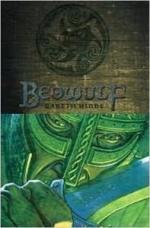[2] R. suggests, ‘Gewat him on naca,’ and renders: The vessel set out, to drive on the sea, the Dane-country left. ‘On’ bears the alliteration; cf. ‘on hafu’ (2524). This has some advantages over the H.-So. reading; viz. (1) It adds nothing to the text; (2) it makes ‘naca’ the subject, and thus brings the passage into keeping with the context, where the poet has exhausted his vocabulary in detailing the actions of the vessel.—B.’s emendation (cf. P. and B. XII. 97) is violent.
[3] B. translates: Who
for a long time, ready at the coast, had
looked out into the distance
eagerly for the dear men. This changes
the syntax of ‘leofra
manna.’
[4] For ‘wunaeth’
(v. 1924) several eminent critics suggest ‘wunade’
(=remained). This makes
the passage much clearer.
[5] Why should such a woman
be described as an ‘excellent’ queen?
C.
suggests ‘frecnu’
= dangerous, bold.
[6] For ‘an daeges’ various readings have been offered. If ‘and-eges’ be accepted, the sentence will read: No hero ... dared look upon her, eye to eye. If ‘an-daeges’ be adopted, translate: Dared look upon her the whole day.
XXIX.
BEOWULF AND HIGELAC.
Then the brave one departed, his band along with him,
{Beowulf and his party seek Higelac.}
Seeking
the sea-shore, the sea-marches treading,
The
wide-stretching shores. The world-candle glimmered,
The
sun from the southward; they proceeded then onward,
5
Early arriving where they heard that the troop-lord,
Ongentheow’s
slayer, excellent, youthful
Folk-prince
and warrior was distributing jewels,
Close
in his castle. The coming of Beowulf
Was
announced in a message quickly to Higelac,
10 That
the folk-troop’s defender forth to the palace
The
linden-companion alive was advancing,
Secure
from the combat courtward a-going.
The
building was early inward made ready
For
the foot-going guests as the good one had ordered.
{Beowulf sits by his liegelord.}
15 He sat
by the man then who had lived through the struggle,
Kinsman
by kinsman, when the king of the people
Had
in lordly language saluted the dear one,
{Queen Hygd receives the heroes.}
In
words that were formal. The daughter of Haereth
Coursed
through the building, carrying mead-cups:[1]
[68] 20 She loved the retainers, tendered the beakers
To
the high-minded Geatmen. Higelac ’gan then
{Higelac is greatly interested in Beowulf’s adventures.}
Pleasantly
plying his companion with questions
In
the high-towering palace. A curious interest
Tormented
his spirit, what meaning to see in
25 The Sea-Geats’
adventures: “Beowulf worthy,




